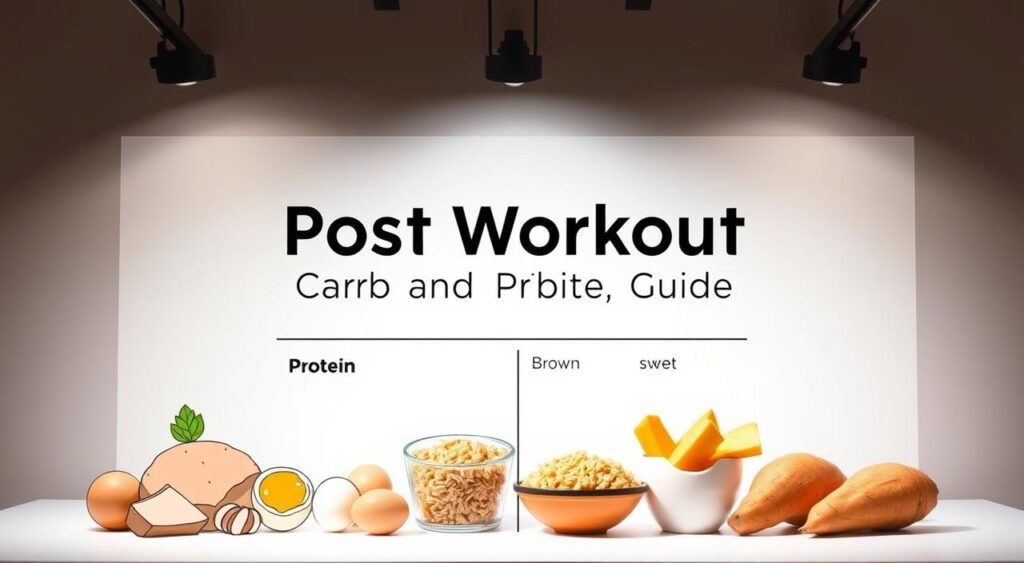Ever wondered why some athletes recover faster? Could it be their post-workout nutrition? Learning the best carb-to-protein ratios after exercise can change the game for you. In this guide, we’ll show how the right nutrition can boost your recovery and help you reach your fitness goals.
We’ll dive into the science of carbs and proteins to find the best nutrition plan for you. Get ready to learn how to improve your recovery and achieve your fitness dreams!
Understanding Carbohydrates and Proteins
Knowing about macronutrients is key for better recovery after working out. Carbohydrates and proteins help refill energy and fix muscles. Let’s explore what these nutrients are and why they’re important for muscle repair after exercise.
What Are Carbohydrates?
Carbohydrates are the main energy source for our bodies. They turn into glucose, which powers our workouts and fills up muscle glycogen. Choosing the right carbs, like whole grains, fruits, and veggies, is vital for quick recovery.
What Are Proteins?
Proteins are essential for fixing and growing muscles. They are the building blocks of muscle tissue, helping us recover from hard workouts. Eating enough quality protein after exercising boosts muscle repair. Good sources include chicken, fish, eggs, and plant-based options.
Why They Matter for Recovery
The mix of carbs and proteins greatly affects how well you recover. Aim for a post-workout ratio that helps with muscle repair and energy refilling. Research suggests a 3:1 to 4:1 carb to protein ratio is best. This balance supports muscle growth and glycogen storage, helping you reach your fitness goals.
| Macronutrient | Role in Recovery | Recommended Sources |
|---|---|---|
| Carbohydrates | Provides energy and replenishes glycogen stores | Whole grains, fruits, vegetables |
| Proteins | Aids in muscle repair and growth | Chicken, fish, eggs, legumes |
The Importance of Post-Workout Nutrition
Post-workout nutrition is key for recovery. It helps repair muscles, grow them, and boosts performance. Knowing the best carbs and proteins after a workout is important. It helps refill glycogen stores and supports muscle growth.
Good nutrition after a workout helps your body recover. It gets you ready for more physical activities.
How Nutrition Affects Recovery
Getting the right mix of carbs and proteins is vital. Carbs help refill glycogen levels. Proteins are important for muscle repair and growth.
This mix helps you recover well. It keeps you energized for your next workout. Skipping nutrition can make you tired and less ready for future workouts.
Timing Your Nutrient Intake
When you eat after a workout matters a lot. Eating within 30 minutes to three hours after is best. This is when your body absorbs nutrients the most.
Eating at this time helps you recover faster. It prepares you for the next challenge.
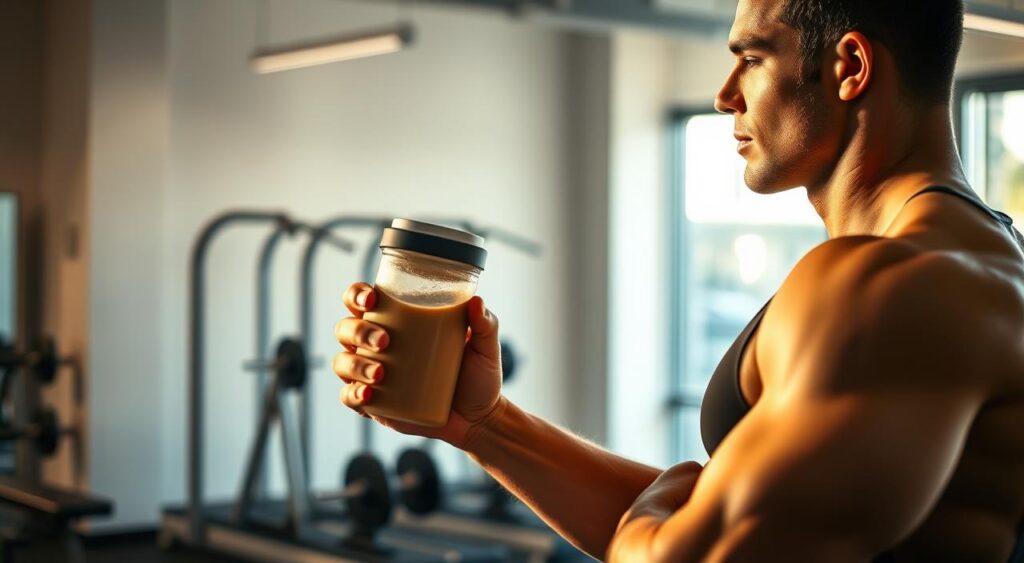
How the Carb-Protein Ratio Impacts Recovery
Finding the right balance of carbs and protein is key to recovering well after working out. Knowing the importance of ratios post workout helps improve your performance and nourishes your body. A common ratio is 4:1, with carbs to protein. This mix helps refill glycogen and fix muscles.
Benefits of Proper Ratios
The carb protein ratio benefits are many. Carbs fill up glycogen stores, keeping energy up during exercise. Protein helps build and repair muscles. The right mix ensures you recover well and perform better in future workouts. It lets you train harder and recover quicker.
Common Misconceptions
Many think protein alone is enough for muscle recovery. But carbs are also vital for energy replenishment. Without enough carbs, recovery and performance suffer. It’s important to adjust ratios based on your workout intensity and duration. For more on managing carbs, check out this link here.
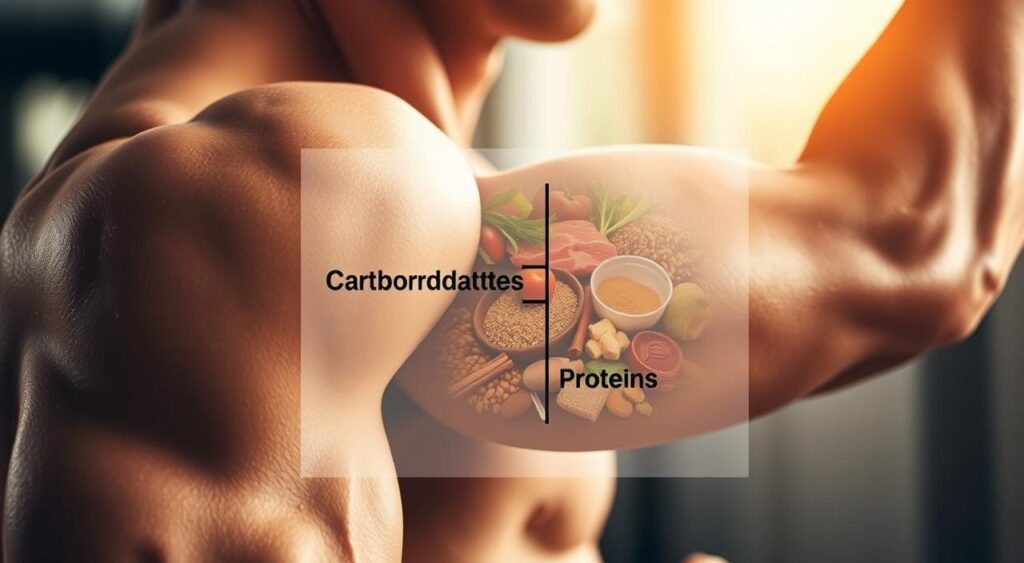
Ideal Carb-to-Protein Ratios for Different Goals
Adjusting your carb-to-protein ratios is key to good post-workout nutrition. It helps with recovery and meets your training goals. Here are tips for the best macronutrient ratios for athletes, focusing on muscle gain, weight loss, and endurance.
For Muscle Gain
To build muscle, aim for a 3:1 to 4:1 carb-to-protein ratio. This ratio helps refill glycogen stores and supports muscle growth. Eating foods like quinoa, chicken, and sweet potatoes can help you reach these ratios.
For Weight Loss
For weight loss, a balanced ratio is better. Go for 1:1 to 2:1 to cut calories while keeping muscle. Focus on whole foods like legumes, fish, and greens to support your weight loss.
For Endurance Training
Endurance athletes need more carbs. A 4:1 ratio is best for long activities, providing energy for performance and recovery. Eat foods high in carbs, like bananas, oatmeal, and protein-rich recovery shakes.
| Goal | Recommended Ratio | Key Foods |
|---|---|---|
| Muscle Gain | 3:1 to 4:1 | Quinoa, Chicken breast, Sweet potatoes |
| Weight Loss | 1:1 to 2:1 | Legumes, Fish, Leafy greens |
| Endurance Training | 4:1 | Bananas, Oatmeal, Recovery shakes |
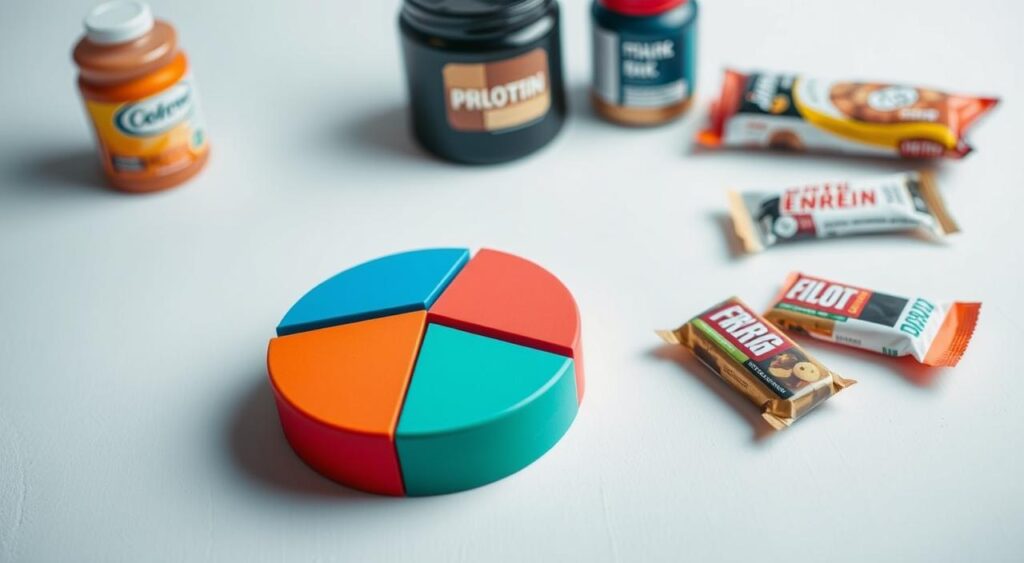
Recommended Foods for Post-Workout Nutrition
Choosing the right foods after a workout is key for recovery and better performance. A mix of carbs and proteins helps repair muscles and refill glycogen. Here are top carb and protein sources, plus tasty meal ideas to mix them well.
Best Carb Sources
- Quinoa
- Brown rice
- Sweet potatoes
- Oats
- Fruits like bananas and berries
Best Protein Sources
- Grilled chicken breast
- Tofu
- Greek yogurt
- Eggs
- Legumes such as lentils and chickpeas
Combining Foods for Optimal Results
Mixing carbs with protein is vital for good post-workout meals. Try a grilled chicken sandwich on whole-grain bread for a protein-carb combo. Or, a protein shake with low-fat yogurt and bananas is quick and healthy. Try different mixes to see what’s best for you.
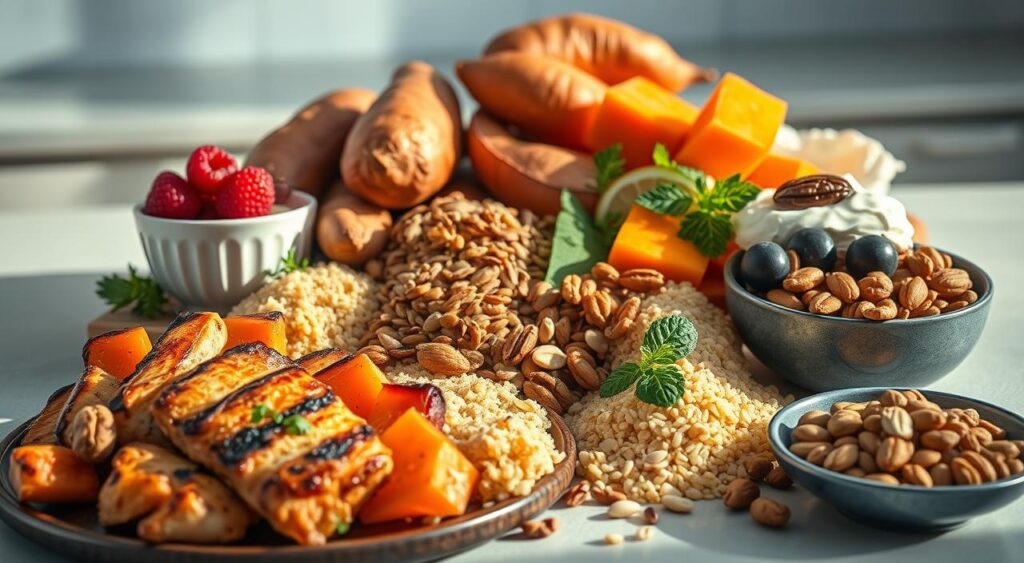
How to Calculate Your Personal Ratios
Learning to calculate your personal macronutrient ratios can greatly improve your recovery. Tailoring your post-workout nutrition is key to achieving your best results. Several factors influence the right amounts of carbs and proteins for you.
Factors to Consider
Your carb-to-protein ratio depends on your body weight, workout intensity, and fitness goals. First, figure out your daily calorie needs. Then, set aside about 20% of your calories for post-workout nutrition to aid in recovery.
Easy Guideline for Calculating
To find your macronutrient ratios, multiply your body weight in kilograms by specific numbers. Use 4 for carbs and 1 for proteins. This gives you a starting point based on your body weight. Keep an eye on how your body reacts and adjust the ratios as needed.
Supplements: Do You Need Them?
When thinking about post-workout nutrition, many wonder if they need supplements. Whole foods should be your first choice for nutrients after exercise. But, if you’re really busy or training hard, supplements might help with recovery. Knowing your options can guide your choices.
Popular Post-Workout Supplements
Some of the most popular recovery supplements include:
- Protein powders, like whey or plant-based options, support muscle repair.
- BCAAs (branched-chain amino acids) can help reduce muscle soreness.
- Carbohydrate-specific recovery supplements work to replenish glycogen stores.
Choosing high-quality products that fit your fitness goals can improve recovery.
When to Consider Supplementing
Do you need supplements? Consider these situations:
- If you find it hard to get all the nutrients you need from food.
- During high training periods, when quick recovery is key.
- If your activity level needs extra support that food alone can’t give.
Adding the right post workout supplements to your routine can help a lot with recovery.
Sample Post-Workout Meals and Snacks
Finding the right post workout meal ideas can really help your recovery. It’s key to mix carbs and proteins in your snacks. This helps refill your energy and fix your muscles. Here are some quick and easy ideas, plus balanced meal examples to aid in your recovery.
Quick and Easy Ideas
- Yogurt parfait with fruit and granola for a tasty treat.
- Protein smoothie blended with spinach, banana, and almond milk.
- Peanut butter on whole grain toast topped with banana slices.
- Cottage cheese with pineapple for a sweet and nutritious option.
Balanced Meal Examples
- Grilled chicken with quinoa and sautéed vegetables for a nutrient-dense choice.
- Turkey wrap with whole grain bread, lettuce, and tomatoes for balanced nutrition for recovery.
- Baked salmon with brown rice and steamed broccoli for healthy fats and fiber.
- Chickpea salad with feta and mixed greens for a plant-based option rich in protein.
The Role of Hydration After Workouts
After a tough workout, drinking enough water is key to recovery. It helps repair muscles and boosts your next workout. When you sweat, you lose water and important salts. Replacing these is essential for energy and recovery.
Importance of Hydration
Drinking water is vital for many reasons. It keeps your body cool, helps your joints, and carries nutrients. Without enough water, you might feel tired, perform worse, and even cramp up. Knowing how important water is after exercise helps you stay hydrated.
Tips for Rehydrating Properly
- Start with water: Aim for at least 16-24 ounces of water for every pound lost during your workout.
- Incorporate electrolytes: If you engaged in prolonged exercise, consider sports drinks or electrolyte tablets to restore essential minerals.
- Monitor your urine color: A light yellow color indicates proper hydration, while a darker shade suggests a need for more fluids.
- Set a schedule: Make it a habit to drink water regularly throughout the day, not just after workouts.
- Eat hydrating foods: Incorporate fruits and vegetables with high water content, such as cucumbers and watermelon, into your meals.
Drinking the right amount of water after working out is simple but effective. By following these tips, you can improve your health and performance.
| Hydration Source | Hydration Benefits |
|---|---|
| Water | Essential for basic hydration and gut health. |
| Electrolyte Drinks | Restores lost minerals and improves energy. |
| Coconut Water | Natural source of electrolytes and hydration. |
| Fruits and Vegetables | Provides hydration along with vitamins and minerals. |
Conclusion: Optimizing Your Recovery
To fully optimize recovery, it’s key to understand the importance of post-workout carb-to-protein ratios. These ratios are vital for how well your body recovers after exercise. Finding the right balance can improve your recovery and boost your performance in future workouts.
Final Thoughts on Ratios
When exploring post workout recovery strategies, try different foods, ratios, and timings. What works for you might not match what others suggest. Your body is unique, and adjusting your intake based on personal experience can lead to better results.
Encouragement to Experiment and Adapt
Be open to changing your approach as you learn more about your body. By trying out different ratios, you can fine-tune your recovery and set yourself up for long-term fitness success. Embrace this journey to find your perfect post-workout nutrition plan and see your performance improve.

